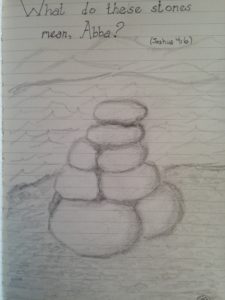 Remember. It’s one of my favorite words in Scripture. It shows up 187 times in the Old Testament alone; fifty more in the New Testament. Remembering is central to the Jewish feasts and fasts; it is central to the two ordinances Christians around the world celebrate today: the Lord’s Supper and Baptism.
Remember. It’s one of my favorite words in Scripture. It shows up 187 times in the Old Testament alone; fifty more in the New Testament. Remembering is central to the Jewish feasts and fasts; it is central to the two ordinances Christians around the world celebrate today: the Lord’s Supper and Baptism.
Remembering is what national holidays are all about, too: Memorial Day, Veteran’s Day, Thanksgiving, the Fourth of July here in the US; Tag der deutschen Einheit (Day of German Unity) in Germany; Genocide Memorial Day in Rwanda; others in other nations.
When Joshua led the Israelites across the Jordan River, he had twelve men each carry a stone from the middle of the now-dry river bed. When the reached the western bank and set up camp, these stones were set in a pile…
6 …so that this will be a sign among you. In the future, when your children ask you, ‘What do these stones mean to you?’ 7 you should tell them, ‘The waters of the Jordan were cut off in front of the ark of the Lord’s covenant. When it crossed the Jordan, the Jordan’s waters were cut off.’ Therefore these stones will always be a memorial for the Israelites.” (Joshua 4:6-7)
In the US, today is Memorial Day; it is appropriate to remember the sacrifices made by those men and women who died serving and protecting our nation’s freedoms. But for Christians, it is also—and always—appropriate to remember what God has done for us; not only the sacrifice that Jesus offered to secure our freedom from sin, but the daily provision of God as well as the “big things” He has done just for you:
- that time God clearly, perhaps immediately, answered a prayer
- the job you have or promotion you received; your paycheck
- the food on your table
- the neighbor who looks out for your kids after school
- the teacher who inspired you in 5th grade
- the bed you sleep in, home you have (even if it’s too small, noisy, or in the “wrong” place; check out Jeremiah 29!)
When you’re out and about today, stoop down and pick up a stone and think about one of those times that God showed up for you. Hold onto the stone or put it in your pocket, and every time you feel it, thank God for His presence and work in your life.
Remember.

 Just looking at this picture makes my mouth water for the Brötchen I gobbled down during my high school days in Germany. I’ve never found them anywhere else—certainly not as good. Crunchy crust (but not too), tender inside…and always best first thing in the morning, fresh out of the baker’s oven.
Just looking at this picture makes my mouth water for the Brötchen I gobbled down during my high school days in Germany. I’ve never found them anywhere else—certainly not as good. Crunchy crust (but not too), tender inside…and always best first thing in the morning, fresh out of the baker’s oven.